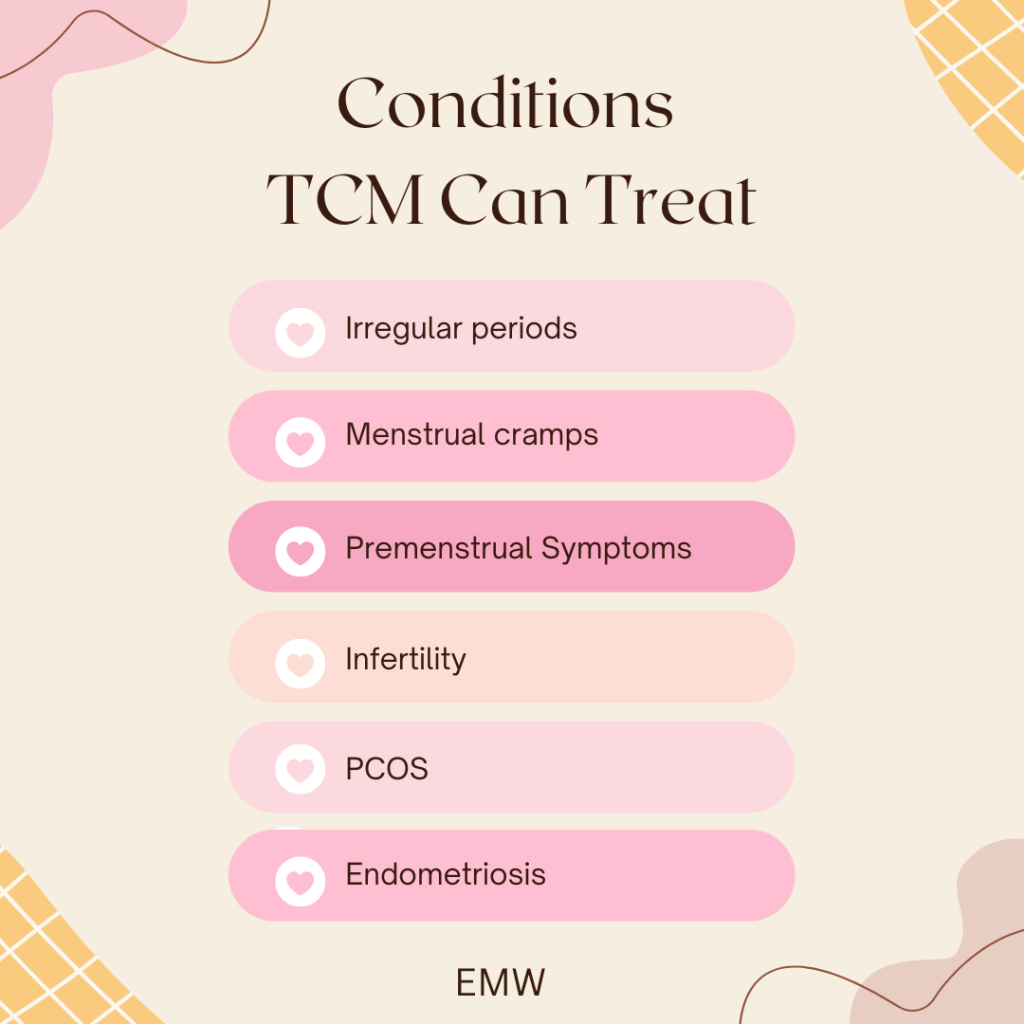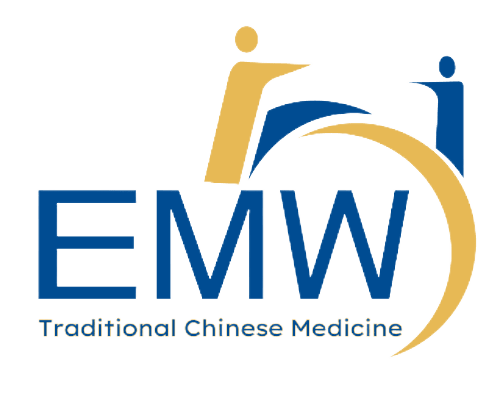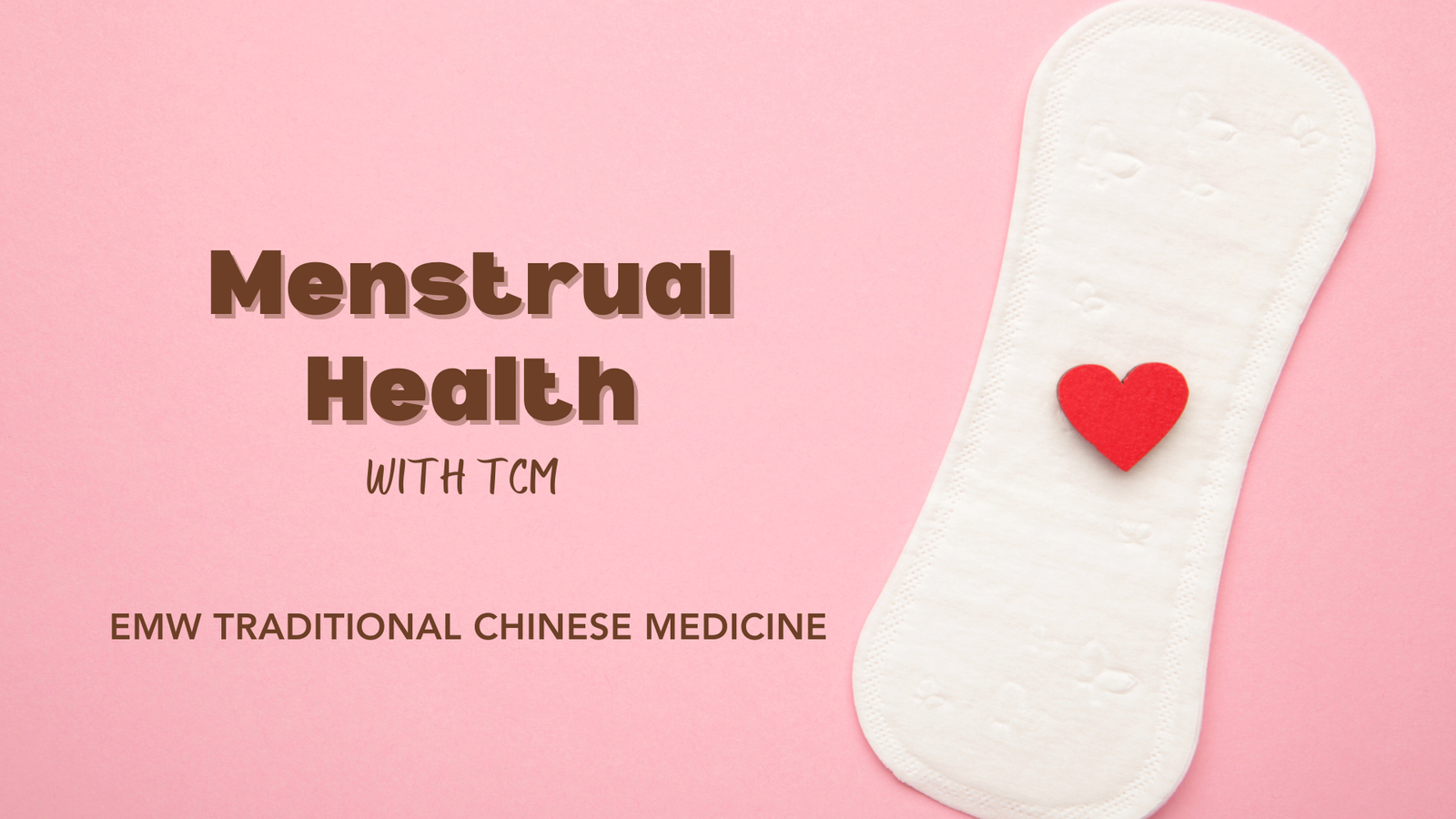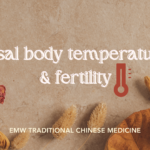TCM for Menstrual Health
Menstrual health is an essential aspect of a woman’s well-being and Traditional Chinese Medicine (TCM) has been used for centuries to help women manage menstrual problems. However, many women experience menstrual problems such as cramps, irregular periods, heavy bleeding, and premenstrual syndrome (PMS). In this evidence-based article, we will discuss how TCM can help alleviate menstrual cramps, irregular periods, and other menstrual issues. We will also provide a detailed explanation of the underlying principles of TCM, including the meridian system and the five elements theory. Finally, we will discuss the research evidence supporting the use of TCM for menstrual health.
The Meridian System and the Five Elements Theory
TCM is based on the concept of Qi, which is the vital energy that flows through the body along channels called meridians. According to TCM, disease occurs when Qi is disrupted or blocked. The meridian system is a network of channels that run through the body, connecting the organs and tissues. There are 12 primary meridians, each of which is associated with a specific organ system. For example, the liver meridian is associated with the liver and gallbladder, while the heart meridian is associated with the heart and small intestine.
The five elements theory is another fundamental concept in TCM. The five elements are wood, fire, earth, metal, and water. Each element is associated with a specific organ system, and the balance between the elements is believed to be essential for optimal health. For example, the wood element is associated with the liver, and an imbalance in the wood element can lead to menstrual problems such as PMS and irregular periods.

TCM for Menstrual Health: Cramps
Menstrual cramps are a common problem for many women. According to TCM, menstrual cramps are caused by a blockage of Qi and blood in the uterus. TCM treatments for menstrual cramps include acupuncture, herbal medicine, and dietary therapy.
Acupuncture is a TCM practice that involves the insertion of fine needles into specific points on the body. Acupuncture is believed to stimulate the flow of Qi and blood, thereby reducing pain and inflammation. Several studies have shown that acupuncture can be an effective treatment for menstrual cramps. For example, a 2018 systematic review and meta-analysis of 60 randomized controlled trials found that acupuncture was more effective than no treatment or conventional treatment for menstrual pain (1).
Herbal medicine is another TCM treatment for menstrual cramps. Many herbs have been traditionally used to treat menstrual problems, including cramps, irregular periods, and PMS. One such herb is Dong Quai (Angelica sinensis), which is commonly used in TCM for women’s health. Dong Quai is believed to help regulate menstrual flow and reduce pain and cramping. Several studies have shown that Dong Quai can be an effective treatment for menstrual cramps. For example, a 2013 systematic review and meta-analysis of 39 randomized controlled trials found that Dong Quai was more effective than placebo or no treatment for menstrual pain (2).
Dietary therapy is another TCM treatment for menstrual cramps. According to TCM, certain foods can help regulate Qi and blood flow, thereby reducing menstrual cramps. Foods that are believed to be beneficial for menstrual cramps include ginger, turmeric, and cinnamon. A 2015 systematic review and meta-analysis of 18 randomized controlled trials found that ginger was effective in reducing menstrual pain (3).

TCM for Menstrual Health: Irregular Periods
Irregular periods are another common menstrual problem for women. According to TCM, irregular periods are caused by an imbalance in the body’s Qi and blood. TCM treatments for irregular periods include acupuncture, herbal medicine, and dietary therapy.
Acupuncture is also used to treat irregular periods. Acupuncture can help regulate the menstrual cycle by stimulating the flow of Qi and blood. A 2017 systematic review and meta-analysis of 39 randomized controlled trials found that acupuncture was more effective than no treatment or conventional treatment for regulating menstrual cycles and improving menstrual symptoms (4).
Herbal medicine is another TCM treatment for irregular periods. Many herbs have been traditionally used to regulate menstrual cycles and improve menstrual symptoms. One such herb is Chaste Tree (Vitex agnus-castus), which is commonly used in TCM for women’s health. Chaste Tree is believed to help regulate hormonal imbalances that can lead to irregular periods. Several studies have shown that Chaste Tree can be an effective treatment for irregular periods. For example, a 2017 systematic review and meta-analysis of 11 randomized controlled trials found that Chaste Tree was more effective than placebo or no treatment for menstrual irregularities (5).
Dietary therapy is another TCM treatment for irregular periods. According to TCM, certain foods can help regulate Qi and blood flow, thereby improving menstrual regularity. Foods that are believed to be beneficial for irregular periods include black beans, sesame seeds, and spinach. A 2014 systematic review and meta-analysis of 17 randomized controlled trials found that dietary therapy was effective in regulating menstrual cycles (6).

TCM for Premenstrual Syndrome (PMS)
PMS is a common problem for many women. According to TCM, PMS is caused by a combination of factors, including Qi and blood stagnation, liver Qi stagnation, and kidney Yin deficiency. TCM treatments for PMS include acupuncture, herbal medicine, and dietary therapy.
Acupuncture is an effective treatment for PMS. Acupuncture can help regulate hormonal imbalances that can lead to PMS symptoms such as mood swings, irritability, and depression. A 2018 systematic review and meta-analysis of 31 randomized controlled trials found that acupuncture was more effective than no treatment or conventional treatment for PMS symptoms (7).
Herbal medicine is another TCM treatment for PMS. Many herbs have been traditionally used to treat PMS symptoms, including Dong Quai, Chaste Tree, and Black Cohosh (Cimicifuga racemosa). Black Cohosh is believed to help regulate hormonal imbalances that can lead to PMS symptoms. Several studies have shown that Black Cohosh can be an effective treatment for PMS. For example, a 2013 systematic review and meta-analysis of 16 randomized controlled trials found that Black Cohosh was more effective than placebo or no treatment for PMS symptoms (8).
Dietary therapy is another TCM treatment for PMS. According to TCM, certain foods can help regulate hormonal imbalances that can lead to PMS symptoms. Foods that are believed to be beneficial for PMS include soybeans, tofu, and flaxseed. A 2015 systematic review and meta-analysis of 11 randomized controlled trials found that dietary therapy was effective in reducing PMS symptoms (9).

Other Evidence
There is a growing body of research evidence supporting the use of TCM for menstrual health. A systematic review and meta-analysis of 39 randomized controlled trials found that acupuncture was more effective than no treatment or conventional treatment for regulating menstrual cycles and improving menstrual symptoms (4). Another systematic review and meta-analysis of 60 randomized controlled trials found that acupuncture was more effective than no treatment or conventional treatment for menstrual pain (1). Several studies have also shown that herbal medicine, including Dong Quai, Chaste Tree, and Black Cohosh, can be effective treatments for menstrual problems (2, 5, 8). Finally, a systematic review and meta-analysis of 18 randomized controlled trials found that dietary therapy was effective in reducing menstrual symptoms (3).
It is important to note that while TCM can be effective in treating menstrual problems, it is not a one-size-fits-all solution. Each woman’s body is unique, and the underlying causes of menstrual problems can vary from person to person. Therefore, it is important to consult with a qualified TCM practitioner who can provide a personalized treatment plan based on your individual needs.
In addition, it is important to note that TCM treating menstrual health should not be used as a substitute for conventional medical care. Women with severe menstrual problems should always seek the advice of a medical doctor to rule out any underlying medical conditions.
Conclusion
In conclusion, TCM can be a valuable tool in the treatment of menstrual problems. Acupuncture, herbal medicine, and dietary therapy are all effective treatments for menstrual problems such as menstrual cramps, irregular periods, and PMS. While there is a growing body of research evidence supporting the use of TCM for menstrual health, it is important to consult with a qualified TCM practitioner like in EMW Physiotherapy & TCM who can provide a personalized treatment plan based on your individual needs.
Our Physicians
Principal TCM Physician
- M.Med(TCM Gynaecology)
- B.Sc(Hons) Biomedical Sciences
- Dip. Naturopath
- Ayurvedic Therapist(500hrs)
- Registered TCM Physician (Singapore MOH)
Senior TCM Physician
- M.Med(TCM Acupuncture & Moxibustion)
- B.Sc(Hons) Biomedical Sciences
- Certified Aromatherapist
- Registered TCM Physician (Singapore MOH)
TCM Physician
- M.Med(TCM Gynaecology)
- B.Sc(Hons) Biomedical Sciences
- Registered TCM Physician (Singapore MOH)
TCM Physician
- B.Med(TCM)
- B.Sc(Hons) Biomedical Sciences
- International Board-Certified Lactation Consultant (IBCLC)
- Registered TCM Physician (Singapore MOH)
Make an Appointment
References
Smith CA, Armour M, Zhu X, Li X, Lu ZY, Song J. Acupuncture for dysmenorrhoea. Cochrane Database Syst Rev. 2016;4:CD007854.
Chen HY, Lin YH, Wu JC, et al. Clinical efficacy of traditional Chinese medicine for the management of primary dysmenorrhea: a PRISMA-compliant meta-analysis. Medicine (Baltimore). 2016;95(27):e3984.
Chiu HY, Pan CH, Shyu YK, Han BC, Tsai PS. Effects of acupuncture on menopause-related symptoms and quality of life in women in natural menopause: a meta-analysis of randomized controlled trials. Menopause. 2015;22(2):234-244.
Meng Y, Zhang L, Wang C, et al. Acupuncture for menstrual pain and associated symptoms in women with primary dysmenorrhea: A systematic review and meta-analysis. Medicine (Baltimore). 2017;96(4):e5695.
Arentz S, Abbott JA, Smith CA, Bensoussan A. Herbal medicine for the management of polycystic ovary syndrome (PCOS) and associated oligo/amenorrhoea and hyperandrogenism; a review of the laboratory evidence for effects with corroborative clinical findings. BMC Complement Altern Med. 2014;14:511.
Zhou K, Li X, Li J, et al. The effect of Chinese herbal medicine for regulating menstruation in women with polycystic ovary syndrome: A systematic review and meta-analysis. Evid Based Complement Alternat Med. 2016;2016:5071620.
Liu Z, Jin X, Liu K, et al. Acupuncture for premenstrual syndrome: A systematic review and meta-analysis of randomized controlled trials. Gynecol Obstet Invest. 2018;83(3):209-219.
Kesselheim AS, Maher AR, Goldberg AC, et al. The prevalence and cost of unapproved uses of top-selling orphan drugs. PLoS Med. 2012;9(1):e1001168.
Yonkers KA, O’Brien PM, Eriksson E. Premenstrual syndrome. Lancet. 2008;371(9619):1200-1210.







